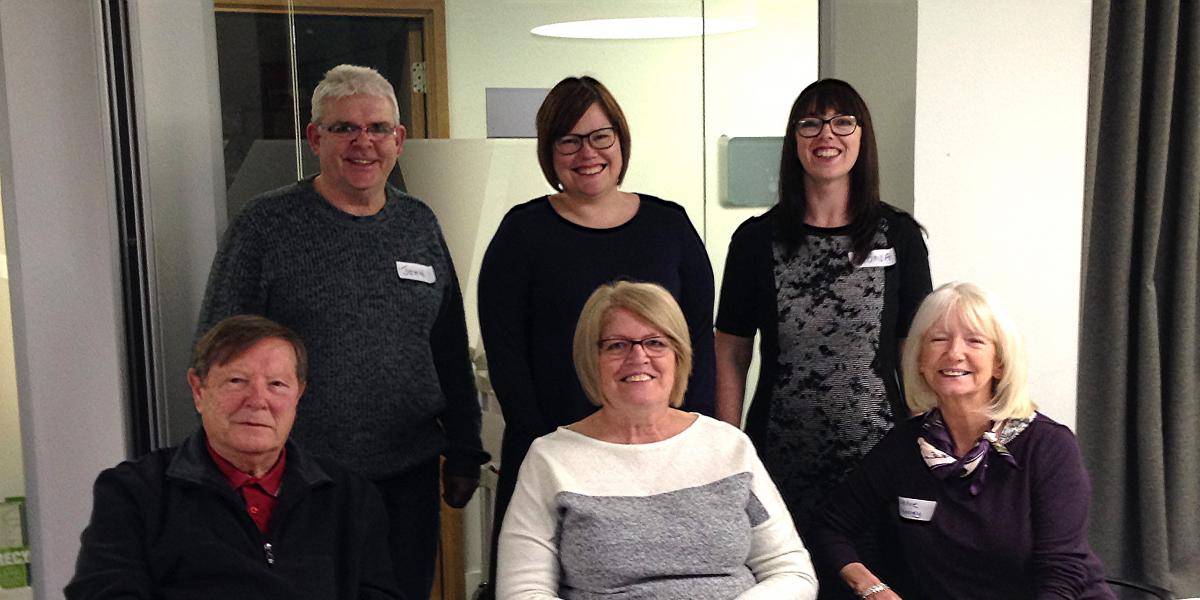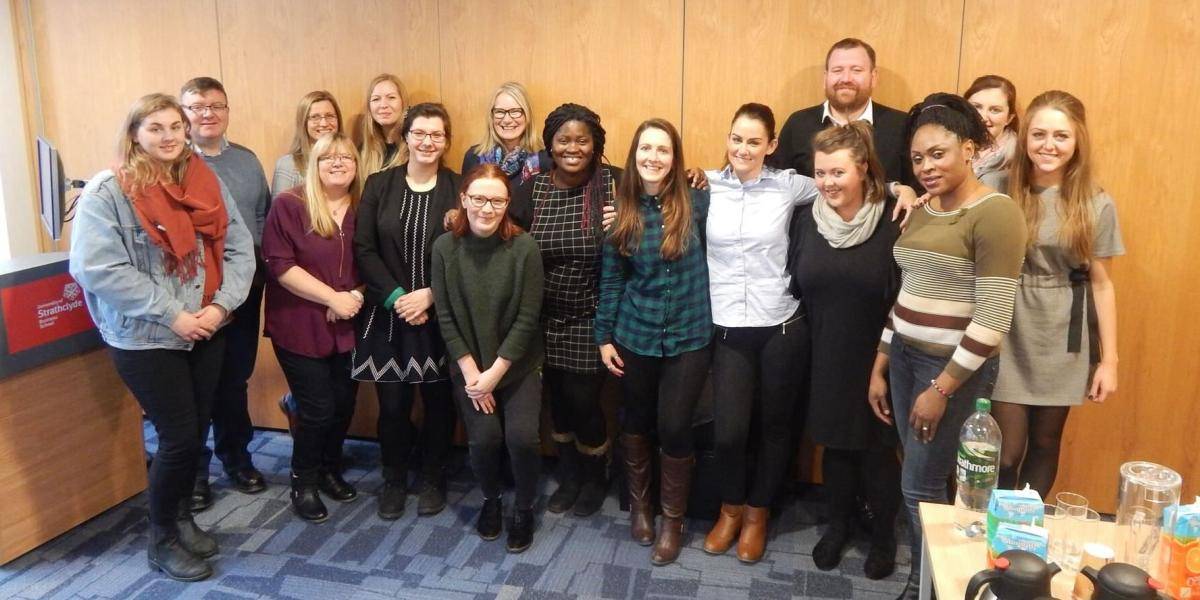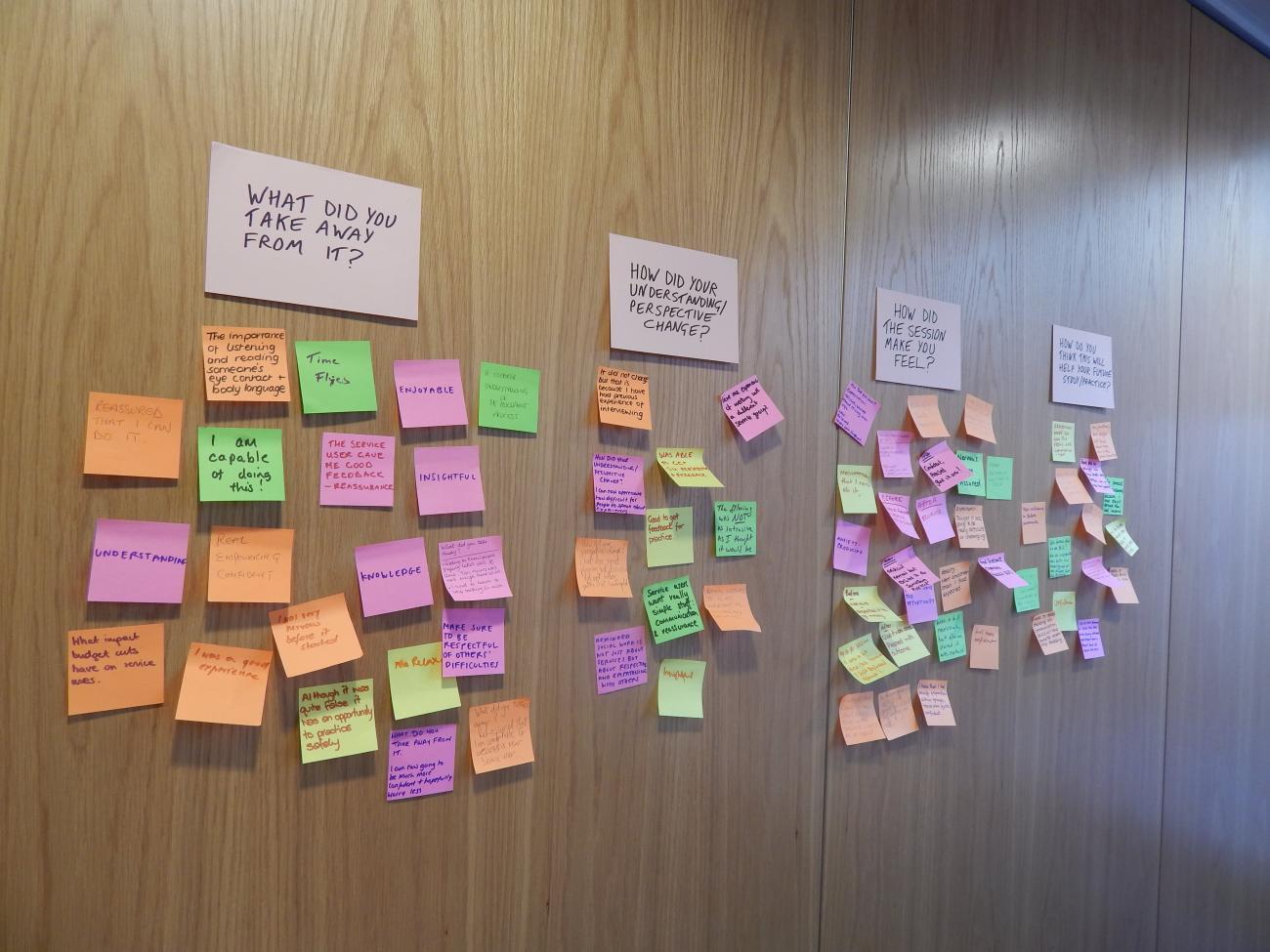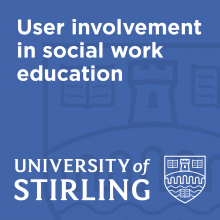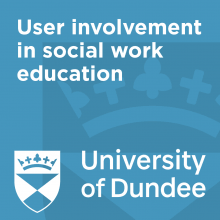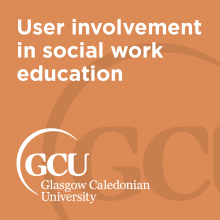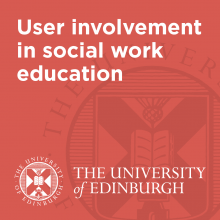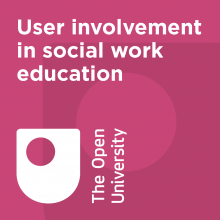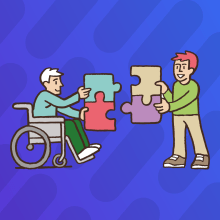This is one of seven stories, showcasing what service user and carer (SUAC) involvement in social work education looks like, what makes it work and what benefits it brings. It has a significant role to play in shaping the next generation of practitioners.
SUAC involvement in social work education has been mandatory for 15 years now, so there is a lot of learning to share with others who can learn from this - transferrable to educators and practitioners working across public services, and relevant to policy-makers committed to mainstreaming person-centred – or person-led – approaches based on real partnership working between those who use and those who deliver services.
Summary
This story is based around role play sessions that are held between social work students at the University of Strathclyde and members of the service user and carer group. The role play is part of an exercise called Fitness to Practise, so students have to take part in a role play before they go out on placement (this is done with second year undergraduate students on the BA course as well as first year students on the Masters course). Previously these sessions were carried out solely between students, but that didn't seem to be working, with it being much harder for students to imagine each other as service users and to use that experience to inform their future work.
Over the last 10 years this has evolved from these student-to-student sessions, to interactions where care and support experienced people, who have had contact with social workers, come in and role play themselves with the students. Instead of a solely imaginary scenario for the student, the role play interview is loosely based around their own previous experiences. The student is given preparation in the form of a short written brief that is prepared by the service user. This is to imitate the type of preparation they would do in a real situation, with case notes before meeting a person for the first time.
On the day of the role play, the student enters a room to meet the service user/carer as if they are entering a real life situation. There are generally two chairs in the room and the student is given ten minutes to speak with the service user, with a couple of minutes directly afterwards for the service user to give them feedback. The role play is video recorded and the student reflects back on this video and the service user feedback to write an essay on their learning and experience. So, the role play itself is not assessed as part of the course, but the essay is. The reflection and learning is the most important part. The service users generally perform between three and five of these individual sessions with students on one given day.
Key learning from the course coordinators and service users
We brought together two of the course coordinators and four of the service user and carer representatives to have a hour long discussion around the role play sessions. Below are some key themes and quotes from that discussion.
Role play to real play – learn it and feel it
But it's that realness and authenticity that you bring that they {students} connect with you on such a human level, that's what sticks out for people, and it's not just about learning something from you, but it's feeling something from you.
There was a thread through the discussion that highlighted the strength of having the service users connect with the students, using experience from their real life connections with social workers. The service user scenario briefings that the students read beforehand, the people they met, and the situations they were exploring were steeped in reality. Often that reality is not an easy one for those role playing with the students as they have to revisit times that were difficult:
I've got my scenario in here and I've got an old one and I've got a newer one and I think… they were both a very difficult time in my life...it can bring out emotions from the past but being able to pass on to them {the students} something which is truly real, a time in my life and my son's life and let them be able to make something of that as a piece of work that they can reflect on. You just can't beat that
An example of the commitment to the principle of realism is shown by one of the service users below. The connection with the students on this role play is not just what is said and written, but the visual and embodied cues of that human interaction:
To let you understand, I prepare a couple of days beforehand. I don't shave and I don't wash my hair and I put my buttons out of sequence in my t-shirt and I ruffle my hair so I look as if I'm a bit down
This exemplifies the dedication that service users and carers bring to this work. However, they were also keen to explain the importance of the connection between themselves and the students as being mutually beneficial.
2. Mutually beneficial
At the core of this was the satisfaction that the service users and carers received from knowing that their input was helping shape the thoughts and careers for the future generation of social workers:
You want them to be better, not to make the mistakes that were made with us.
That often was the root motivation, but they also went further to explain what they gained from involvement with the students:
I'm not just a carer or whatever you know, you've got something to offer and it's being used and it does give you more confidence.
You know I'm not just here because they've got to do this and its part of the course, you do feel appreciated.
There were links made between contribution to education and feeling appreciated, and the subsequent confidence and satisfaction this gave them as an individual. There was also a feeling of belonging within the group, of being in it together and supporting each other. This connected to the role play sessions but also to the wider activity of the service user and carer group within the social work degree delivery.
3. Get the support right
Behind the role play sessions themselves lies the preparation and administration of making sure the service users, carers and students are all emotionally supported and prepared to take part. One of the coordinators explained how this has evolved:
I think in the beginning, in the early days it was all quite complicated and trying to sort out the logistics of it all so I think the focus was on just trying to actually get it right in terms of how many students, how many people were coming in to do the role plays, at what times and I think the bit about actually having a chat and having a coffee and just relaxing and getting some support maybe wasn't as prominent in the early days
This comes with a recognition that the role plays do not happen in isolation. Service users need to be included in discussions with the course coordinators to shape the sessions. They need to be emotionally supported as they are being asked (and volunteer) to share very personal stories and experiences. There needs to be feedback for the service users as well as the students. They need to feel appreciated, even by small acts, like a supply of coffee and tea. Some of the service users mentioned that they would like more time, both on the role play days, and afterwards, to debrief with each other and the course coordinators, to reflect on how the sessions have went, learn from each others experiences, and also make sure everyone was happy with how things went. One person spoke of 'mentoring' some new members of the group by outlining how they 'spoke to them about our approach and how we had dealt with it and obviously we'd been doing it for a few years… almost mentoring in a way just by having discussions about how we approached it'. These supports and relationships are needed as 'part of relieving the stress' as the service users can also feel nervous before the sessions, or anxious afterwards.
Beyond that, at a very basic level, the service users and carers need to physically get to the sessions:
...without good admin staff as well running the back show as it were and doing all the details. Things like organising taxis...
...even about the housekeeping, about how we get here, how we're supported to get here, how we're supported while we're here, before and after… you know it's made simple, almost, there's hiccups sometimes in how it's all managed, like anything but I think knowing you're supported to come here and play your role makes it easier.
As with all of our stories about service user and carer involvement, relationships are key, between service users and carers, the academics and the students. What is also key is the resource to support these interactions. Service users should be equal voices and influencers around any table, and that means their time and experience are valued in monetary recompense, as well as thanks.
4. Ripples into the future - students remember
There were a number of examples shared where students remembered the service users and carers that they had their sessions with. As is reinforced by the student audio in the next section, this contact is often self-reported by the students as being one of the highlights of their course. Some of the service users spoke of bumping into students who remembered them from contact ten years ago. There were also numerous examples of students approaching them to thank them:
She came and said 'you did my role play with me, at Strathclyde.' She says 'and I really thank you for that.' And another time we were sitting waiting, we were in one of the universities, I can't remember which one or where and we were sitting waiting for someone to come and meet us and a girl came up to us and said 'You probably don't remember me but you did our role play.' And it's happened quite a few times and it does, it makes you think, well if they can remember you, you must have had some impression on them.
Having these types of interactions really strengthened some of those motivations described earlier, and gave a continuing impetus and justification for keeping this involvement going:
Knowing that I've made a difference to somebody's life... I'm a giver so I want to give anything that I've ever learned, pass it on to whoever needs it and that's exactly it. Always has been.
These sentiments and the comments from the students reflect how this approach has real potential to be used in other settings to help strengthen student or early career connections with service users, whether that be in social services, in health or in other care and person-focused settings.
Student reflections
We facilitated a group reflection session with 16 of the social work students, held straight after they came out of the role play scenarios with the service user and carers. Before we went into the discussion, they were asked to note down some of their thoughts on post-its and put them up on the wall for others to see.
Key responses
What did you take away from it?
- I am capable of doing this!
- I was very nervous before it started
- The importance of listening and reading someone's eye contact and body language
- The service user gave me good feedback - reassurance
- I am now going to be much more confident and hopefully worry less
How did your understanding/perspective change?
- Reminded me social work is not just about services but about respecting and empathising with others
- I can now appreciate how difficult it is for people to speak about experiences
- Gave me experience of working with a different service group
- The filming was not as intrusive as I thought it would be
How did the session make you feel?
- Glad to have the opportunity
- Nervous… then assured
- Anxiety-producing
- Went smoother than I expected
- Challenging… tense
- Feel more confident
- I would have liked to have spent more time with service users as a group
How do you think this will help your future study/practice?
- Will be better informed when talking to service users for real
- More confidence in future assessments
- Helps to refocus thinking on communication skills - will help towards relationship building
- Good reminder it is a personal story and understanding
- More assured that service users are approachable
The audio of the discussion that followed this can be listened to below. The students discuss: their expectations in the run-up to the role play interviews; their different experiences of the session; the value they give to this contact and feedback; and what else they would like to see and experience around the involvement of service users and carers in their course. This combines to give a wonderful insight into the real value that this has brought to their education and how they see the contact informing their future careers. What is particularly impressive is the critical reflection they bring to the discussion, sharing their own perspectives but also exploring how they think this contact and connection with service user and carers could be expanded on and strengthened.
This also resonated with some of the course coordinator and service user discussion where, given more resource (time, money, people) they would like to have this service user/student contact and approach expanded, and do this in conversation with the students themselves. This expansion would include being able to carry out these types of sessions in more real physical settings (in homes or the community) and also with a more diverse range of service users represented. At the moment, the group has few young people with service experience and isn't very culturally or racially diverse. The students, service users and carers and course coordinators would all like to build on that in the future.
Student discussion
Int. Great so who would like to get us started, I think that was a really good question beforehand on what your expectations were of what it was going to look like or what it was going to be like doing this roleplay, so does somebody want to get us started on some of those expectations of what it was going to be like?
F I don’t know, I think expectations are that we’re going to feel very under the microscope, that we’re going to be judged or analysed in some way which we will do ourselves later on but I think once you get into it, you realise the focus is not you it’s the service user. And I think that clicks in quite quickly which I maybe wasn’t expecting to happen you know, I thought I might feel quite anxious all the way through but once my focus shifted that made a huge difference.
F I think as well, I thought I was going to be really nervous but once you get in there, it goes so the anticipation kind of went pretty quickly and then you can just relax into it so I think it’s been built up in your head but then once you go in there. Although it was going to be really artificial, it didn’t feel as artificial because the service user kind of brought on their real-life experience from what happened to them at that time so they weren’t being artificial, they were being real so it did kind of have a sense of realness about it I think.
F I think as well with the service user that I had interviewed, he also made you feel comfortable because obviously he was speaking so openly about his own life but I think before you even go into the interview you’re just nervous, you’re apprehensive, you don’t know what he’s going to do or what he’s going to say like if he’s going to trip you up or anything like that but they’re not there to do that, they’re there to actually make sure that you’re a decent enough person to actually go into practice but I think when we had done … like we done a 2 week kind of practice session on ways to speak to people and the importance of communication skills and stuff like that but they role plays, I didn’t think were anything like the real thing, it’s very different I would say.
F I feel the same way actually, it actually feels that the role-play we did was more intense and more … and (… unclear) than the real thing actually and the service users were very, very relaxing so that makes me to feel very relaxed as well so I was able to communicate well with him and that’s from that aspect even now I don’t believe myself so that was good.
F Yeah, I was really looking forward to getting some contact with a service user because we spent so much time in the classroom and you learn about you know, all the policy and the legislation but really when you’re sat face to face with someone that’s when it counts and you can’t teach that sat in a classroom so I was really looking forward to being able to actually put everything we’ve learnt so far and try and use it and the service user we had did try and trip us up on the confidentiality thing and kind of at the last minute it kicked and he said “Well why do you have to pass some details on?” and it was like “Well, you know that’s the law it’s legal if you know you’re at risk or whatever.” So, it was good to get that, so I was really looking forward to speaking to (… unclear)
F Even just somebody asking you “So where does that come from?” and you’re thinking “Where does that come from? Data protection, it’s the law!”
Int. Fall back position, great it’s the law … have to do it!
F Yeah, I also thought that it would be a lot more nerve wracking cos of the camera cos you can be a lot more natural when you know it’s just you and during the practice sessions it was … you could feel the camera and this time I absolutely forgot about the camera within 3 seconds which was amazing. I did not … I knew at some point I would but it was so quick. They were just not intrusive at all.
M I jotted down a few ideas to try and guide me just in case it all went to pot but the actual exchange itself didn’t bare any resemblance to kind of the way that I’d anticipated which I suppose is a good thing because it means it’s an authentic dialogue.
Int. So, was that like prompt questions or bits of things to fall back on?
M Yeah, yeah, I just kind of how I might have imagined the thing going in my own head, just if I ever had brain freeze then it was something that I could look down at but it wasn’t hugely necessary.
F It went a lot quicker, cos when we did the roleplay in the class the 10 minutes felt like a lifetime but in the actual real scenario it went so fast I felt like I didn’t have enough time to discuss everything so I think because it was a real situation whereas in the class the students are trying to think what somebody would say and it’s not a real situation for them so they can’t really talk as in depth as the service users were able to.
F Uh huh really, cos I actually eventually used 15 minutes because no one came to knock, they forgot about us. I was so thinking (… unclear) 10 minutes but then it was 15 minutes so I decided I’d leave here now.
F I think I would have liked longer with the service users, I could have stayed and chatted for a lot longer. I really would have liked to, even as a group you know have met up with the service users and be able to have a cup of tea or a cup of coffee and really go through their experiences especially with social work department. I’d like to know what they really think and what’s really behind their stories so I felt that was a bit of a missed opportunity.
F I definitely felt like because of that time restraint instead of maybe following on what she had, I was like “Well I need to cover this and this.” So, I think it didn’t seem as natural because you didn’t have that space to maybe kind of explore a little bit more about what the service user was saying. I know that’s maybe not true for everybody but I felt that way.
F It might have been better if they had said to use “Well you have half an hour, you don’t need to use that entire time but if you think that you know, and leave it a wee bit open rather than like a very set deadline because in real life you’re not going to go in with a stop watch and say “Right go, 10 minutes.”
F Technically (… unclear)
F Yeah and then you know, you’ve got to the end it was very rushed and I didn’t have a chance to even say to the service user “Thank you for speaking with me.” It was just really “Okay send you a letter with my next appointment, bye.” And that’s like a really bad way to end our interview.
F I think because there was like sort of curve balls thrown into our interviews, there was … it took up a lot of time at the beginning as well so it felt like you were probably about 5 minutes into it before you actually got a chance to ask a question. I mean like between going over the whole confidentiality thing and being questioned on that and then changing seats and things like that. I mean like by the time I actually was sitting down and ready to ask a question, it felt like about a minute before the door knocked to say that it was time to stop but then that’s probably the reality often because you’re going into situations and you don’t know what’s happened to that person the night before. You don’t know how they feel about you coming in and you can’t put a time on it, I just feel like anything could happen whenever you go out to speak to someone and you might use the whole interview dealing with that situation rather than actually going in to talk to them about what you went for.
F I think as well it emphasised the importance of being able to be adaptable and actually change really quickly in a situation so like when Maria said when we were in the room with the service user that we had been allocated, he was hard of hearing so he was saying “I need to go somewhere else, I need to swap.” So, having to actually swap seats when you’ve just went in, you’ve introduced yourself, you’re about to have all your spiel in your head … “I can’t hear what you’re saying, I need to swap seats with you.” And I’m like “No bother, lets swap seats … where was I?” and you’re trying to think in your head, “Have I even covered confidentiality, did I say that or have I missed that out?” but in real life there are people who are going to have different communication needs and I think you do need to be aware of that.
F I think that they had a more challenging service user, I think that we had actually a very easy one and you also have the issue when it’s very easy and you can tell she’s so experienced and she’s guiding things and you know that this is way too easy, this won’t happen because she’s just giving you all information “And I want this, and this is what the support I have and blah.” It’s too, too ordered, too simple and you know it’s lovely to talk and you’d love to chat with her but you know that in real life it’s not going to be that good, that easy.
F I think that’s one of the things that came up in the role play, when we done the role play and some of us were service users, asking things like “So, what does that word actually mean?” like I’ve done interviews before with children and young people and they’ve said to me “I don’t know what that word means, can you explain that to me?” because you’re just so used to having this jargon that when you go and you interview somebody or interview somebody who has got any sort of difficulties in communication and you’re using convoluted terms that they just don’t get, I think it’s really important to make it plain English. I think there’s nothing worse than being in a hospital and they’re talking about you and it’s all these medical terms that you’ve never heard of and you don’t know what’s wrong with you.
F Yeah, I think that’s something I maybe did a bit wrong like I said phrases like “Coping mechanism” like people don’t know what that means like you know it’s quite important to remember who you’re speaking to.
M I think the biggest thing for me was that within the sort of brief synopsis you get of the service user, and it said that he was quite reluctant and we went through that in the class and said he’d had quite a negative experience previously with social work so I was quite nervous about broaching the subject and I thought I was going to get quite a negative response for him but he was actually really understanding and I actually empathised with him because the things he was saying were actually quite straight forward. He just wants a response, somebody to actually show the curtesy of actually phoning him or sending him a letter or something you know and I thought, yeah that’s absolutely fine.
F I think (… unclear) raise their hopes actually and that was what happened to him because we had the same person and he said you know the social worker he had before raised the hope sort of level and then they couldn’t get anything no outcome of whatever they’d discussed so I was like “Okay so, I can promise you I would get back to you this time around, don’t worry.” So, I think it’s always good to not to promise, maybe get back to the office first and see what you can come up with before you come back to them and tell them what we can realistically do and put it in place for them.
F Aye, people have more respect for you if you’re actually realistic and you’re saying to them “Do you know what, I don’t know the answer to that but somebody will and I’ll go and check and I’ll get back to you and when I get back to you we can take things forward but at the moment I don’t know.” Whereas I think in some circumstances when you feel under pressure there’s almost this urge to say “Yeah, that’s no bother I’ll do that within a day.” It’s not realistic, anything could happen and actually giving people like you said, (… unclear) … giving people things that are realistic is helpful for you as well cos if there’s things that come up and you’ve maybe got a report to write or somebody goes into emergency care, then obviously you need to deal with that as well.
F I think just having an open mind as well cos when we read our little scenario before it said that the gentleman had depression and it was all very negative so I was thinking that that’s what the interview was going to be like but it was actually very positive and that was in his past but now he’s in a much more positive place so I think just like go in with an open mind and not think it’s going to be quite a negative interview just cos that’s what it says on the referral.
F I think, just to add to that, it makes it a bit more real for me cos I went in thinking he had a physical disability (… unclear) and now the mental health thing, but I realised that the person is stronger than, I mean mentally, the person has gotten over some of these challenges or impediments that we thought he had so it gives you a new ground to explore further, yeah.
F Yeah, I think that’s why like these interviews are so good and meeting like a real service user cos you’re not going in to like show off all the knowledge about what you can do but you’re kind of getting to know them and realising how well they’re coping and their strengths and things like that. I think I was really reminded of that in the interview because she was kind of talking about how she was coping so well …
F I think it’s the difference between a personal story and a case study …
F Yeah.
F … that you see on paper is a case study, when you’re sitting in with someone it’s a personal story and it completely changes.
F Yeah.
F I think getting feedback as well from the service user was really helpful, so at the end of it we were encouraged to ask “Do you have any feedback for us, could we have done anything differently?” and the service user that I had had, had given me like 3 points so these are things you could have done a wee bit differently but these are all the things that you done well so being able to actually note them down is going to help me to reflect on it before I actually go into practice and if I go into somebody’s house and I’m working with an older adult I can be like “Oh would you like to be called a certain name or do you prefer something else?” just really small tips but it can make the world of a difference.
F And our service user had said the he purposefully didn’t shave for 3 days, so that he looked a bit unkempt so it looked as if he wasn’t coping, any of us didn’t pick on it and I had said to him at the end, I said “Well have you seen lads these days? They don’t shave, they all have beards and it’s the hipster style so someone of my generation … if a guy didn’t shave I wouldn’t even notice.” But then thinking “Well actually if you’re from an older generation, you know men shaved and wore a shirt and tie and you know had their hair cut.
F Even his hair, he was saying, “Did you notice my hair?” and I was thinking, “I just thought you were windswept.” Like it’s a pretty windy day outside, “I’m really sorry, no I never.” And he had said that he’d deliberately mixed up his buttons, but he had a black polo shirt with a fleece on top of it so you would have had to have been sitting pretty close and like examining to be able to see. I’m like “Oh I never noticed that either, I’m really sorry.”
F It was really useful though just to be mindful if you’re working with a particular service user group, if it’s somebody of a different generation maybe to think about actually what’s important you know, to people who … it would go the same way if it was young people, you know, how do young people dress and should I be you know, noticing things like that?
F Worried if they’ve got a suit and tie and they’re appearing in court.
F I think from what you’re saying what I’m taking from that is, we should be prepared to identify or, yeah, with different generations and other cultures as well because that’s what I’m getting from that okay because you identify or you have knowledge about the particular group of people … be it generation or culture you would be able to identify things more easily or be able to pick up things that are not said, better than those that are … yeah.
F I think what you say about people from different cultures would be really useful, we haven’t focused at all on how would you speak to someone who maybe struggles with English, who needs an interpreter or someone who’s from a different culture, you know, how would you respond to … for example in some cultures, some men it’s inappropriate to you know, have eye contact with a woman and to be shaking hands with a woman and we haven’t really had the chance to actually discuss and practice you know how … so it might have been useful to actually get to speak to a service user who is from a different culture.
F I think as well that could have been a wee bit more focused on ethics around interviewing especially in relation to if you’re working with a particularly vulnerable group, which we will be on placement. In the past I’ve interviewed children and young people who had a parent in prison and obviously if you’re approaching a sensitive topic then you want to know “Well, can I ask they questions, am I cause them more harm than anything else?” but I don’t think we really covered a lot of that, it was just “here’s about confidentiality” but not so much about “here are the ethically implications behind why you have to.” Cos when a service user’s in front of you asking you “So, why, why is confidentiality important?” you’re then thinking on the spot, you’re thinking “God, why is it important?” but I think if there was a wee bit more of a focus on that and on approaching different service user groups it would have been really helpful.
F Yeah, I think it will be really valuable to have a chance to work with someone who doesn’t want to speak to you rather than someone who’s really willing to engage with you as well so obviously people from different backgrounds, different nationalities as well.
F I think that would be good for the next interview.
F I think with the first one, I think it’s good to just to have someone that is quite open so you can kind of practice like those kinds of skills first of just being empathetic and welcoming and kind of that kind of thing and maybe do that after.
F I think maybe though it can give you a false sense of security because you’re maybe …
F I need a false sense of security.
F … you’re maybe thinking “Oh that’s quite good, that went really well. Wait till I go into a social work office and I go out and I meet someone and they’re going to be okay because that person’s been okay.” But in reality, people are not going to like you for being a social worker a lot of the time and are going to be resistant and I think like what you had just said, that would be helpful for somebody to be like “No, I don’t want to talk to you, so what do you actually mean, why are you here? What do you want in my house?” or “I don’t want social work intervention, I never asked you to come it was my daughter.” Just different ways to try and … cos we need to know how to approach that in practice.
F Yeah, we haven’t really covered how do you behave in a situation like this, have we?
F We’ll be like “Aw, alright pal ehm … just send somebody else.” But you can’t do that in practice.
Int. Unbelievable we’ve been chatting for 20 minutes so it’s now 5 to one, so I’m going to round everybody and see if anybody wants to add anything. If there’s anything burning, that you’ve not managed to say so we can just go round clockwise and if anybody’s got something to say feel free to.
F Just really that it was quite a reassuring, positive experience.
F Yeah, I would agree.
F Yeah, I agree.
F Yeah, and just sort of repeating before I think it would have nice if we’d spent more time with the service users. I think because they were particularly open which has been great for us but because they’re open it would have been a real opportunity to get some insight. I think that’s the only thing I want to reinforce.
F I didn’t feel like it was quite artificial, it actually felt quite real for it was a surprise. I didn’t think it would be that real.
F Just think it sort of (… unclear) practice and I think like every time you have an interview with a service user, you learn something else about yourself and how you’re carrying out the interviews, it’s just practice.
M Just to put on record, that how much we appreciate the fact that people have given up their time to come and help us with that because it’s a really valuable …
F Yeah.
F It is.
M … and they really don’t need to do that.
F And it must have been quite difficult for them as well to go through their experience with so many …
F Again and again.
F … again and again, yeah.
F I think it’s one of those things that, like say if you hear role-play or you hear like interviews you kind of like “Oh my god, this is going to be terrible.” And you’re thinking of everything negative but actually it’s probably the most positive thing that you do, even in uni we’ve done role-plays in class and it’s how a lot of people remember it because you’re practicing it. So, I do think that it is a really valuable tool.
F I think that because the service users have so much experience, they’ve done it a few times already they gave you information before you even ask the question. That was my impression you know, I didn’t really have to ask the question the lady was already talking. It felt like she led the interview more than me at some point, yeah.
F I did think it was a great opportunity, especially to get the feedback from the service user because you’ll not often going to get feedback on your own practice. You’re on a one to one with people, you’re not going to be able to look back on that and go “Well, I was rubbish there or I should have asked that question.” So that’s a good opportunity to get the feedback for going into practice.
F Yeah well, I agree, (… unclear)
F I think just what Anna’s said there, you said there just made me think about them being leading it. So, it’s all that person-centred practice now isn’t it? So, it kind of just reminded me that that is what we should be doing, sitting back and kind of letting them so that was good to think … to actually see it rather than just read about it.
F Yeah, I think I’ve learned a lot from doing this, much more so than if it was just a written assessment or maybe an exam even would, it’s been for me it’s felt a lot less pressure and a lot more beneficial than like a written exam …
F Yeah.
F Yeah.
F … I think.
F Definitely.
F I think it should be the essential part of the course …
F Yeah.
F … really, yeah.
F Uh huh.
F I think we would even benefit from more workshops for sort of like more vulnerable, resistant service users, you know if we have a few and that’s incorporated because we’re going to go on in January and go into the real world and start dealing with the situations and maybe we will have the best way to do it and if we do it now, maybe we’ll develop you know from the get go, we’ll have a bit better approach so that’s something that would be very beneficial.
Int. Any other very, very super final thoughts?
F Nope.
Int. Great, I’ll stop recording. Thank you all.
